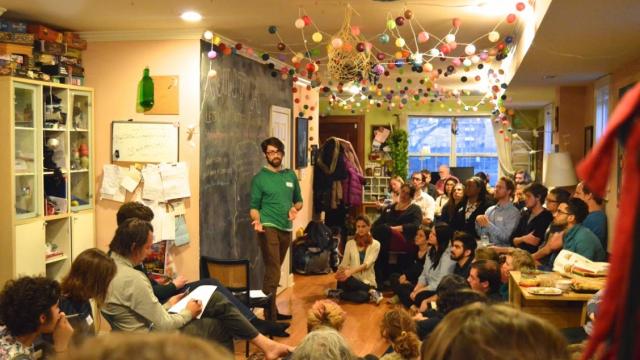
In the ongoing series “From the Ground Up,” Occupy.com joins Commonomics USA presenting stories about local efforts to create a new sustainable economy.
“Being poor is hoping the toothache goes away,” Hugo Award-winning author John Scalzi wrote in a personal blog post over a decade ago. “Being poor is a heater in only one room of the house... Being poor is needing that 35-cent raise... Being poor is six dollars short on the utility bill and no way to close the gap... Being poor is knowing you work as hard as anyone, anywhere.”
Economic insecurity is the American nightmare. It kills us earlier, messes up our mental health, saps the life out of us. Since Scalzi’s 2005 post, we’ve learned that more than 60 percent of us can’t afford a $500 emergency – which roughly translates to hoping the toothache goes away. That’s a pretty raw deal in exchange for an economic system that’s also killing the planet. And only rarely can we count on others to help us out. They’re either broke themselves, or profiting from our financial instability.
“Being poor,” Scalzi wrote, “is relying on people who don’t give a damn about you.”
But there are groups of Americans who are turning that indifference on its head. Within the larger intentional communitiesmovement are a growing number of egalitarian, income-sharing communities, whose members combine their wealth and income to create spaces where people make economic decisions cooperatively, rely on one another and a democratic policymaking process for security, and cease to consider finances—or their financial challenges—the responsibility of lone individuals. The financial families they create range from a half-dozen to nearly a hundred people, in locations from urban Baltimore, Portland and Washington D.C. to rural Missouri and Virginia.
In mainstream society, poverty is a tremendous waste of human resources, including time and health. “The human potential that is lost is massive,” says Sky Blue, Executive Director of the Fellowship for Intentional Community and a second-generation member of Twin Oaks, the nation’s largest income-sharing community. If you’re opposed to capitalism and this waste of potential, Sky tells me, “there’s an imperative to share income.” Its proponents say it works, and they have evidence: People in such communities can live comfortably on as little as $5,000 per-person per-year; if people get too old or too sick to work, they receive support from others in the community and the care-time devoted to them is not a zero-sum game like it is with families in the mainstream economy.
The idea of people (apart from our immediate family) co-owning virtually everything with us is far, far away even from liberal visions of economic egalitarianism. Americans don’t generally share, at least not at a level you can base an entire economy on. At best, in favorable political seasons, we re-distribute. But that’s not enough for income-sharing adherents. They’re even more radical than Marxists. “We’re going beyond ‘owning the means of production,’” Valerie Renwick-Porter, a writer and yoga teacher at Twin Oaks, tells me. “What we’re doing is about owning every aspect of our lives.”
Although income-sharing communities differ in many of their day-to-day logistics, they generally share a number of traits. Income earned, and value produced, by members generally goes directly into the community budget. The community can then scale the cost of all its basic obligations and members’ individual needs; things are always less expensive when you can organize people into larger cooperative systems. Community resources such as land, buildings, vehicles, are collectively owned. Individuals have their individual things (the community doesn’t own your underpants), but there are often rules and norms to discourage the classism of conspicuous consumption.
And typically, there are cooperative work enterprises in the communities, complementing the shared wealth and providing on-site work opportunities for members. Variations exist. Some communities only partially share income. Some share expenses but not income. The common denominator is that in these communities, nobody considers their wealth and property wholly their own.
Potential members must apply and get accepted into the communities; the provisional period is careful and deliberative. Members can be expelled; the due process for that to occur is extensive. The communities can often work with members who have personal debt or financial obligations, but there are limits, and everything is done with careful conversation. “We don’t give everybody a blank check,” Valerie says. Nor, she says, does income sharing “divide it down to the penny.”
Since members must inevitably interact with the outside world, income-sharing makes such interaction easier, creating, Sky says, “a bubble with a semi-permeable membrane” where people receive significant financial security, help others achieve that security, all the while aware that they are not alone. Income-replacing work, like food production, maintenance, and caring for others, is given the economic weight it deserves, rather than being marginalized by a system that discounts much of that productive labor.
It’s not a perfect system. Income-sharing can reveal a microcosm of the good and bad behaviors in society. Property transfer policies and other procedures for negotiating between personal and community property can be challenging. Above all, Sky says, Americans view private property as sacred and talking about personal finances is verboten. “It’s very hard to let go of that way of living even with the best of ideals or intentions,” Valerie adds. “It doesn’t make sense because all of your assumptions come from a different paradigm.”
But the success and growing interest in income-sharing communities suggests that at least some Americans can make the leap of faith. The case for material sharing doesn’t require us to tattoo hammers and sickles on our shoulders, distribute copies of the Little Red Book, or storm any Winter Palaces. The case is very simple: We save resources, and make better use of them, when we share. Members of income-sharing communities can work fewer hours than those in the mainstream economy, and achieve a higher level of material security in those hours. Participation in democratic decision making also helps people become ethical and other-oriented. The added exigencies of economic and ecological crises call for widespread modeling of community income-sharing. Starting to share now could help us dismantle oppressive systems large and small.
Perhaps most importantly, these communities already exist, meaning people can join them or build communities modeled after existing ones rather than waiting for some vanguard revolutionary party to overthrow capitalism first. “You can just make a choice to reorganize your life around compassion and solidarity and cooperation,” G. Paul Blundell, a seed-exchange specialist and member of Compersia in Washington D.C. says in a short video [http://www.theatlantic.com/video/index/501005/income-sharing-commune/] about that community. “You don't have to wait for the rest of the world to come along to do that.”
Matt Stannard is policy director at Commonomics USA.
3 WAYS TO SHOW YOUR SUPPORT
- Log in to post comments

















Comments
DH Fabian replied on
No legitimate discussion
Face it, Americans so strongly believe in the success of our deregulated capitalism that they think everyone is able to work, there are jobs for all, therefore no need for poverty relief. No legitimate economic discussion can exclude our poverty crisis, and there has been no discussion of our poverty crisis in years. Presumably in support of Clinton, some of our liberal bourgeoisie now actually claim that REAL poverty is virtually gone in the US. In fact, we simply no longer have the means to estimate real poverty, since actual welfare has been gone for 20 years.
Before you get too far with planning a better world, you will have to figure this out: What would you do with the jobless poor, and those who can't work? This is the issue that has been sitting in the corner, fuse quietly burning down, sparking the occasional fire in the process.
Beth newman replied on
Capital
What you do is dismantle a corrupt capitalist system that wonders what to do with people who can't work. Only a corrupt system would pose such an obvious deception. And only those who have unwittingly put their faith in that system would have a hard time finding the multitudes of ways to nourish the common good. We've all been had remember...I think you've yet to realize it.
Jj replied on
Just Maybe
I am someone who is troubled by the wealth imbalance in todays world.
Love the ideallic concept of the sharing community, but given that humans can hardly hold together a union between a man and woman I do wonder how a larger group can prevail.
Jesse replied on
re: Just Maybe
I share your concern about wealth imbalance. I personally believe it is what creates ALL our social ills, yet we cling to competitive free enterprise as if it were a godsend, when in fact, cooperative free enterprise is better for all.
To answer your concern, the larger group can hold together their union in the same way a man and woman can -- by agreeing ahead of time how to handle conflict. My wife of 32 years and I came a hair's width from divorce twice. Both times we followed our pre-agreed upon process and worked it out. Intentional Communities today that have conflict resolution processes are those with staying power.
True, there are those individuals who are so wrapped up in themselves and their own selfish desires that they _cannot_ maintain a union. They would either never join or end up leaving the group.
Paxus Calta replied on
Oh it works
Having lived in one of these communities for almost 20 years i can promise you that they work. Besides successfully addressing climate disruption (at our local level) what we also find is that there is a statistically significant higher level of mental health for people who live in intentional communities when compared to those who don't. So let's sum up here, we are not trashing the biosphere, we are cooperating, we are not driving each other crazy. Or you can choose to be greedy and materialistic and work like crazy to maintain it. The choice is yours.
Paxus Calta replied on
Should you want more info
Looking at an intentional communities as though it was an island. https://funologist.org/2011/12/10/re-post-island/
Bill Carlson replied on
Transition
Who is mindful and able to guide interested individuals and families toward and into such as this? Include this assumption: many who may be interested are carrying heavy debt. I want to believe there is a path of transition, and support along the way. I hope to help with this. I'm in debt. That puts me out, for now. And msybe not entirely. Perhaps there is a way to adopt the practices at the personal and small family level. I went to believe there are principles that can apply all over the place. I choose to believe one day I will be part of something as significant as this.